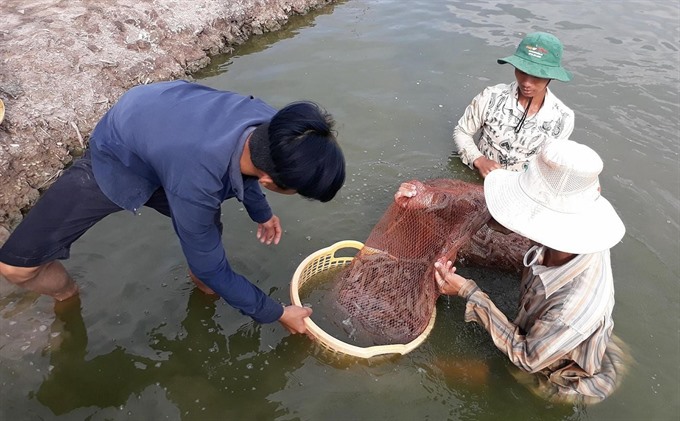 Society
Society

As a new season of prawn breeding approaches, a rash of low quality juvenile prawns this year is troubling farmers in Mekong Delta provinces, the country’s major prawn-producing area.
 |
| Breeding prawns in Bạc Liêu Province. - VNA/VNS Photo Huỳnh Sử |
BẠC LIÊU — As a new season of prawn breeding approaches, a rash of low quality juvenile prawns this year is troubling farmers in Mekong Delta provinces, the country’s major prawn-producing area.
According to local authorities, most of these juvenile prawns were imported from other provinces as home-grown production failed to meet demand.
Since the Tết (Lunar New Year) holiday, Đinh Văn Phong, a farmer at Long Điền Đông A Commune in Đông Hải District in Bạc Liêu Province, has released juvenile prawns three times only to see all of them die.
“Probably their quality was so bad that they could not grow bigger,” he told the Lao Động (Labour) newspaper.
In March, a week-long interdisciplinary inspection by Bạc Liêu Province authorities detected dozens of trucks transporting juvenile prawns without clear origin and quarantine certificates to be sold in Bạc Liêu and Cà Mau provinces, said Nguyễn Duy Hưng, deputy head of Bạc Liêu’s veterinary and animal husbandry branch.
In the evening of March 6 alone, six trucks were found transporting 10 million juvenile prawns with such lack of documentation. All the trucks had licence plates indicating they were from the
Huỳnh Thanh Tòng, an inspector of the provincial Department of Agriculture and Rural Development, said most of these low quality juvenile prawns came from
However, even when violations were detected, it was hard to address them due to the absence of strict rules and provisions for punishment, said a member of the interdisciplinary inspection team.
According to local authorities, the demand for juvenile prawns in Cà Mau Province outnumbers the amount that area growing farms could supply. Likewise, the number of home-grown juvenile prawns only accounts for 60 per cent of the demand in Bạc Liêu.
To tackle the issue, Dương Thành Trung, chairman of Bạc Liêu People’s Committee, said the province would reorganise the provincial prawn markets to make it easier to trade juvenile prawns.
“We will also install machines for quick quality tests to help buyers detect low quality prawns,” he said, adding that more severe punishment would be imposed on transporters of such prawns.
On April 6, representatives of 11 provinces in the central and southern regions, both producers and consumers of juvenile prawns, signed a cooperation document to better control the production and consumption of these products. — VNS




